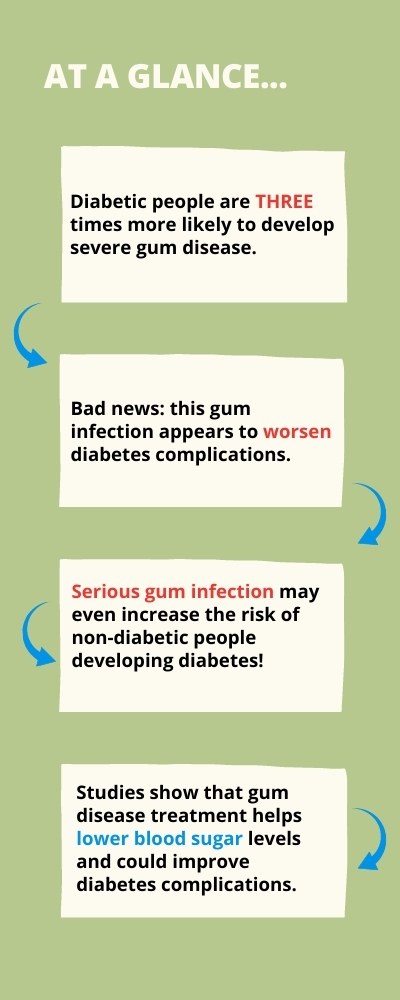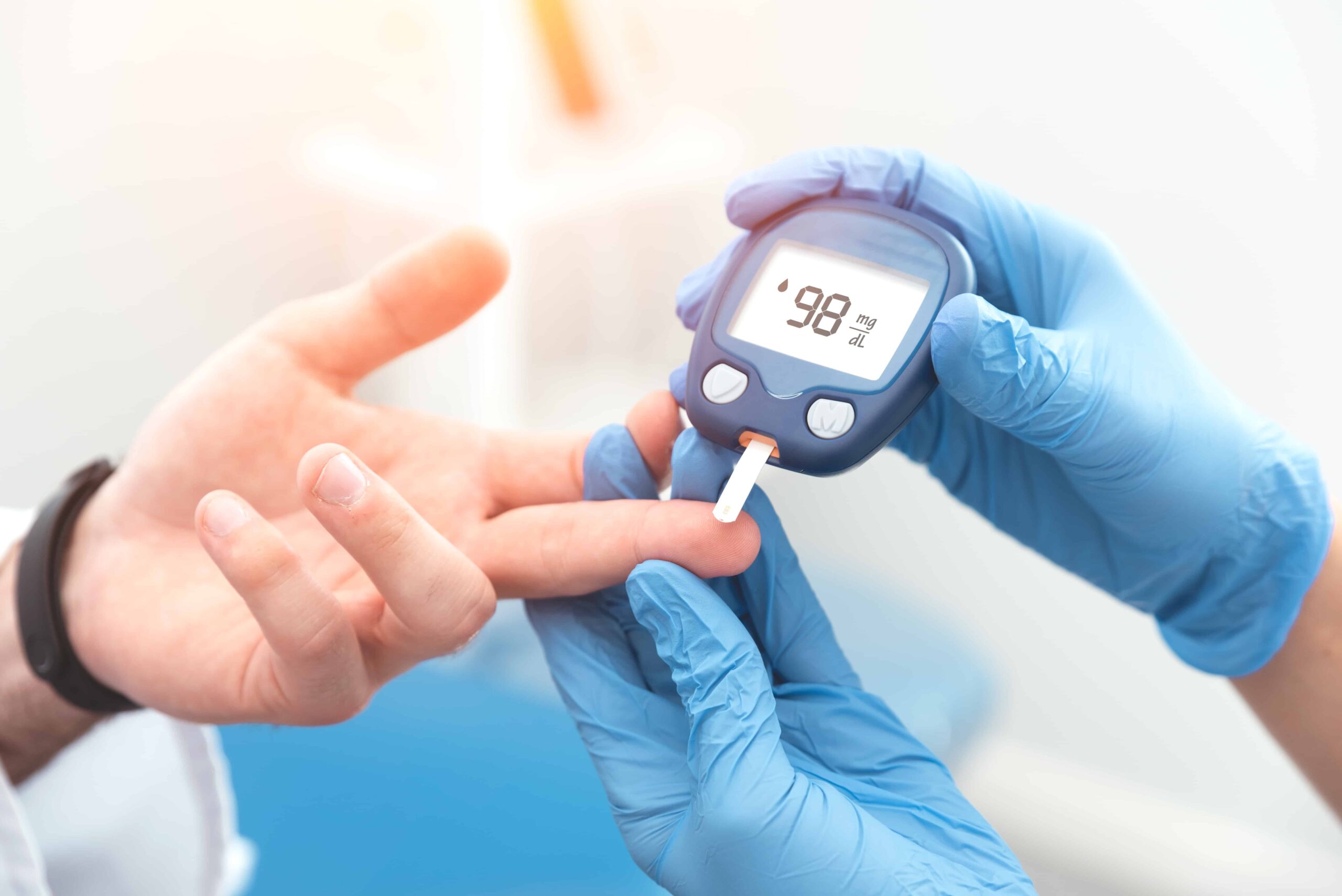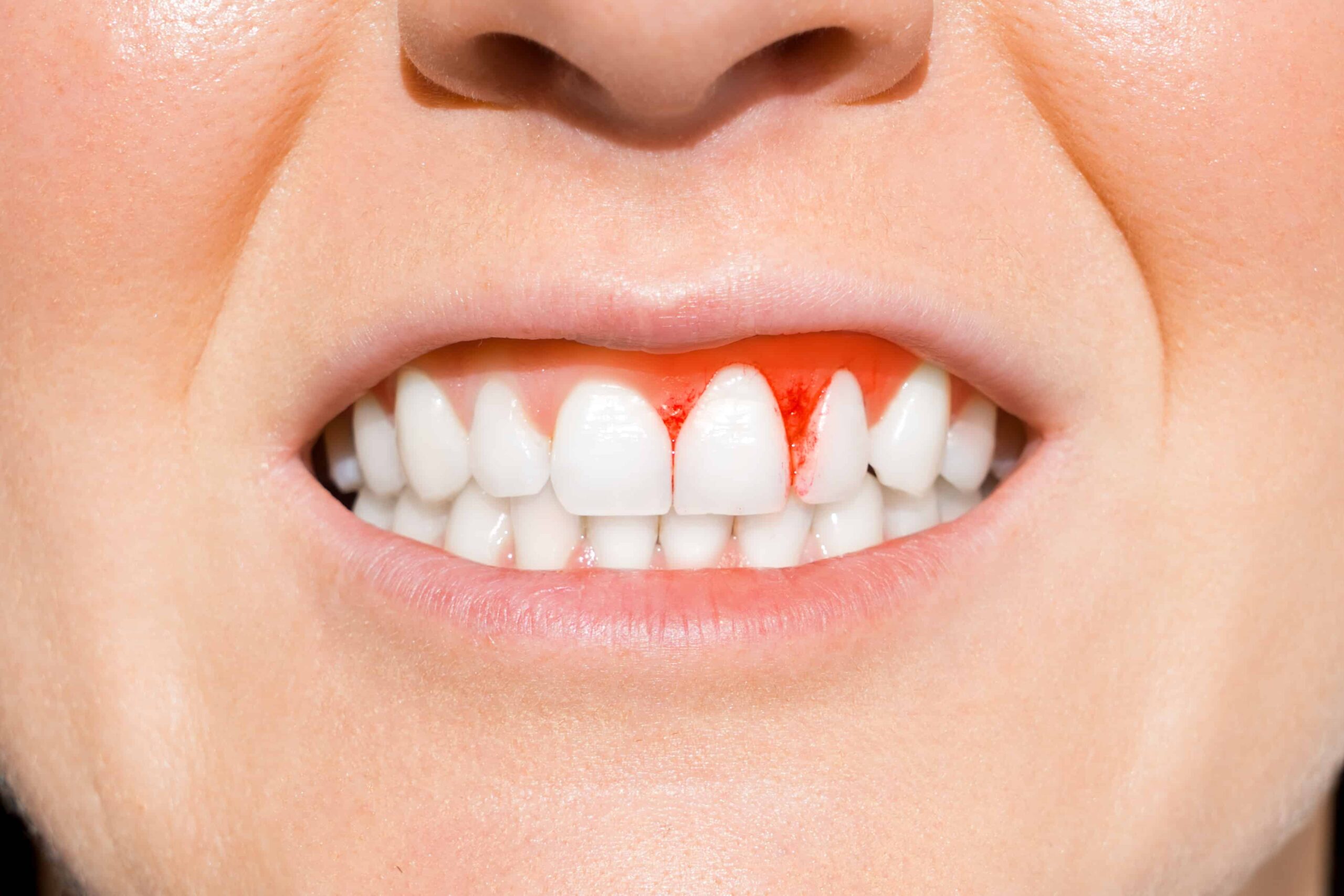We’re not a fan of the two-way relationship between periodontal disease and diabetes.
To start with:
People with diabetes are more likely to develop periodontal disease.
This dental condition is characterised by gum inflammation, and it’s widespread around the world.
There are various stages of periodontal disease, ranging from easily-treatable gum irritation (gingivitis) to severe bacterial infection that permanently damages soft tissue, tooth and bone (periodontitis).
But the connection doesn’t end there.
Perhaps more concerning:
Diabetic individuals with severe gum disease have less control over their blood sugar levels, compared to diabetic people with healthy gums. Advanced periodontitis may actually worsen diabetes complications – such as retina, kidney and cardiovascular problems.
Thankfully periodontal treatment has been shown to improve glycaemic control in diabetic patients with periodontitis, but many health professionals are in the dark about this and more research is needed.
Keep reading to find out what the science so far tells us about the link between diabetes and periodontal disease.
Does diabetes cause periodontal disease?
Not directly, but diabetes is a major risk factor for severe gum disease.
Epidemiological studies show that people with diabetes are three times more likely to develop periodontitis, especially if they have poor glycaemic control.
Most of the studies focus on type 2 diabetes, but findings also apply to type 1 diabetes.
What do glycaemic (blood sugar or HbA1c) levels have to do with this risk?
People with diabetes who have poor glycaemic control tend to have a higher inflammatory response to the bacteria involved in gum disease, so they’re susceptible to developing severe infection (periodontitis).
However this isn’t the case for diabetic individuals with good glycaemic control.
“Thus, in well controlled diabetes with HbA1c of around 7% (53 mmol/mol) or lower, there appears to be little effect of diabetes on risk for periodontitis. However, the risk increases exponentially as glycaemic control deteriorates.” British Dental Journal
A side note:
On top of gum disease, elevated blood glucose levels (and some diabetic medications) can contribute to the development of other oral conditions:
- Tooth decay
- Dry mouth
- Fungal infection (oral thrush)
- Mouth ulcers
- Slow healing of oral wounds
- Modified taste
Gum disease makes it harder for people with diabetes to control blood sugar levels
Severe gum inflammation may raise blood sugar levels and worsen health complications associated with diabetes.
One study into the Gila River Indian Community shows that severe periodontitis was connected to higher risk of poor glycaemic control at least two years after the participants were followed up.
No small finding!
More concerningly, other studies report a correlation between periodontitis and diabetes-related complications such as retinopathy, proteinuria and cardiovascular problems.
Another study into the Gila River community shows that diabetic participants with severe gum disease were 3.2 times more likely to die from heart and kidney damage (cardio-renal mortality) than diabetic individuals without advanced periodontitis.
Thankfully periodontitis treatment has been shown to lower HbA1c levels by around 0.4 per cent, as supported by many clinical studies (but not all).
Consistent findings suggest a small reduction of HbA1c levels has notable clinical implications. Consider the fact that even a 1 per cent drop in HbA1c levels is linked to significant risk reductions for diabetes-related complications.
For example:
- 21 per cent reduction in deaths
- 14 per cent reduction for myocardial infarction (heart attack)
- 37 per cent reduction for microvascular complications
As diabetes educator Sue Cotey comments in this article by Cleveland Clinic:
“I’ve witnessed on multiple occasions that when people with diabetes see the dentist and address any current issues related to gum disease or inflammation, their blood glucose levels respond almost immediately.”
At any rate, we need more research into the relationship between periodontal disease and diabetes, as there are very real implications for how diabetic patients are treated. It appears that dentists have an important role to play in helping people with diabetes to manage their condition by looking after their oral health.
Can periodontal disease cause diabetes?
There’s some evidence that periodontitis can also raise blood sugar levels in people who don’t have diabetes.
A five-year study of non-diabetic participants showed that people with severe periodontitis saw their HbA1c levels rise FIVE TIMES HIGHER than participants who didn’t have periodontitis.
Research from Columbia University Mailman School of Public Health also suggests a two-way relationship between diabetes and periodontal disease.
The study examined more than 9,000 participants over twenty years.
What was discovered?
Participants with elevated levels of periodontal disease “were nearly twice as likely to become diabetic in that 20-year timeframe.”
This suggests that periodontitis may increase an individual’s chances of developing diabetes due to chronic inflammation, but more research and further studies are needed.
Associate Research Scientist Ryan Demmer (PhD, MPH) said about the findings:
“They certainly are thought-provoking, biologically plausible and supported by longstanding research regarding periodontal disease and atherosclerotic cardiovascular disease. While there are no immediate clinical implications that stem from these findings, they do suggest a need for additional research.”
How should people with diabetes prevent gum disease?
It’s crucial that people who have been diagnosed with diabetes understand the connection between diabetes and periodontal disease, so they’re empowered to take the best care of their oral health.
Gum disease prevention advice (specific to people with diabetes):
- Let your dentist know you have diabetes, so they can help you look after your oral health.
- Work with your doctor to keep your blood sugar levels at a safe level. Remember, you’re more vulnerable to oral inflammation if you have poor glycaemic control.
- If you need to treat hypoglycaemia with carbohydrates such as fruit juice or sweets, drink water afterwards to wash away the sugar. Don’t brush your teeth straight away, wait at least 1 hour, to give your mouth a chance to return to normal pH levels.
Advice that also applies to non-diabetic individuals who want to lower their risk of developing diabetes by preventing periodontitis:
- Brush your teeth morning and night with toothpaste that contains fluoride. Gently brush the gums too! Check out this guide from the Australian Dental Association to make sure you’re using the right technique.
- Preferably floss once a day, or every other day.
- If you have dentures, braces or any other dental appliance in your mouth, please clean these carefully as well (following instructions from your dentist). The last thing you want is bacteria building up!
- Eat more nourishing foods and consume less sugar (note: if you have diabetes, consume as much sugar as medically required to manage your symptoms)
- Chew sugar-free gum if you have a dry mouth, as this encourages your body to produce more saliva to clean your mouth.
- Book an appointment with your dentist if you notice any signs of gum disease. Even if you don’t have symptoms, visit your dentist at least once a year for a check-up and thorough cleaning session.
Dental treatment for gum disease
Treating gingivitis (mild gum inflammation):
Gingivitis can be reversed with antibacterial mouth rinses and deep-cleaning treatments at the dentist, if detected in time. Common treatments include scaling and root planing to get rid of tartar. More than one dental visit may be required to treat gingivitis.
Treating periodontitis:
Deep cleaning treatments with prescribed antibiotics (oral tablets or topical gel) usually treat more serious cases of gum inflammation. Enzyme suppressants can also be administered to stop gum tissue from deteriorating further.
In some cases, dental surgery is also needed to restore the tissue around teeth. Bone and gum grafting may be required to support bone growth and cover exposed roots. Periodontal pocket reduction can also be applied to remove any infectious bacteria that lingers.
Mona Vale Dental understands the link between diabetes and periodontal disease
The Mona Vale Dental team is experienced at preventing gum disease, as well as treating every stage of it.
At our Northern Beaches clinic, we do everything we can to provide the best care and help our patients feel comfortable. If you’re anxious about getting treatment, we even offer safe and gentle sedation options!
Fill out this contact form or call our team on (02) 9997 1100 to book an appointment or find out more.







